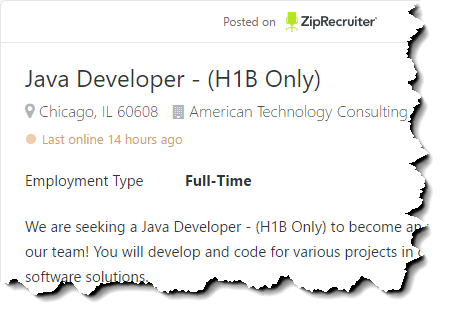 Just how much can ZipRecruiter insult its HR customers and still get their business? And how many arm’s lengths away from federal employment law violations can employers get?
Just how much can ZipRecruiter insult its HR customers and still get their business? And how many arm’s lengths away from federal employment law violations can employers get?
HR: We pay ZipRecruiter to insult us
ZipRecruiter, a venture-funded, privately held company, markets itself to employers as “The Fastest Way to Hire Great People.” It lets HR departments “Post to 100+ Job Boards with One Submission.”
What’s so insulting about that? In a long-running Bloomberg radio ad, ZipRecruiter features an employer who says:
“Hiring people is probably the worst part of my job. It’s such a hassle — the searching. The sorting through resumes.”
Man, doing HR work really sucks. Is that an HR manager grousing? Or maybe it’s a hiring manager? Imagine a sales rep at your company complaining about what a hassle it is to sell.
HR executives ponied up over $100 million in 2016 to ZipRecruiter for help filling jobs so Zip could cast them as dopes who hate the most important part of their work — recruiting and hiring talent. That’s submission.
According to USA Today, “Zip makes most of its money by charging $249 monthly to employers to post [their job] listings.” That’s a lot of job ads. That’s a lot of passing the buck.
What’s it like when the vendor you rely on to do your job for you blares to the world that your job is one big bother? Do HR execs love being insulted? Well, they keep paying for it. “Revenue is up 270% since 2013,” says USA Today.
HR seems to love being abused.
“We started using ZipRecruiter about 3 months ago. Right from the start you could tell it was going to make hiring a lot easier.”
HR also loves getting millions of job applications that no human ever needs to touch. Candidates “roll in.”
“One click and my job was posted to 100+ job boards — all the top sites.”
One click and a job is sprayed all over kingdom come. Says one job seeker:
“I heard an advertisement for ZipRecruiter on the radio. In short, you can post a job on this site and it simultaneously posts it on other job boards and social media outlets. Does HR really need that many applications? Especially in these times?”
The challenge is not picking good hires. The challenge is wiping away the mess of unemployed lemmings dying for interviews. Who needs to learn how to recruit when you can have “all of the candidates” from all of the job boards in your “dashboard”?
What do you do with them?
“All of the candidates came to my dashboard and it’s easy to compare them. Thumbs up if I liked them, thumbs down if I didn’t. No e-mails and attachments, printing up docs, phone calls, none of that.”
Imagine: None of that. No “docs” — no resumes, no application forms. No communications with applicants — “no e-mails, attachments… phone calls…” Nada. 100% keywords, no humans need apply. And HR can go home.
Zip takes care of everything — including turning job applicants into your own private digital beauty pageant.
Except really ugly stuff happens in beauty pageants when there’s no regulation. And while some venture-funded firm sucks up the profits, humans submit and are sent home to clean themselves up for the next opportunity.
What job seekers are saying about ZipRecruiter
While ZipRecruiter’s investors are cleaning up, job seekers are left drowning in the mess.
One job seeker says it for many:
“My Gmail inbox is littered with e-mails from ZipRecruiter, Indeed.com, and others. It is so frustrating to go through the daily search and submission only to get the robo-e-mails from ‘Phil@ZipRecruiter.com’ — the Job Seeker Advocate — and similar messages from Indeed and others. Sometimes I think it’s all one big bizarre video game and I am the hapless mark helping to feed the Monster(.com?). At first, I viewed them hopefully, but now I see them as a part of a giant ruse.”
Another job seeker peals out:
“Things have changed too much for the worse. The old, tried and proven Agencies have gone to wayside and replaced with kids calling me…Saying, ‘Hey, I saw your resume on Indeed or Ziprecruiter or LinkedIn, etc.’ If you put enough monkeys in a room with keyboards eventually semblance of a word will be achieved. If this is how Americans get a decent job nowadays….OMG.”
And then it hits the fan.
H1-B Only: No Americans wanted
Employers operate in today’s “employment system” at arm’s length, enjoying seeming legal insulation by using “third-party” employers — known as consulting or contracting firms — to avoid violating labor laws. And these third-party firms in turn use services like ZipRecruiter to “recruit” at arm’s length while pretending they have no idea that the machine is cranking out Soylent Green.
Now here’s the backlash employers have exposed themselves to. My good buddy Suzanne Lucas, aka The EvilHRLady, just reported that the veil has been “accidentally” parted to reveal what’s really going on: legal violations.
What would you say to a job posting for a “Java Developer – H1-B Only?”
In her Inc. column last week, Iowa Company Accidentally Says No Americans Need Apply, Lucas turned up the heat on IT consulting firm American Technology Consulting, which posted the job. “In case you’re wondering what the problem is with the ad,” writes Lucas, “it’s that it violates one and possibly two laws.”
Lucas reported that Tara Jose, the president of ATC, said, “a third-party vendor recently used language when posting an advertisement on our behalf that was inappropriate and absolutely unacceptable to American Technology Consulting.”
Uh, “a third-party vendor?” (By press time Ms. Jose had not responded to an e-mail query for details.)
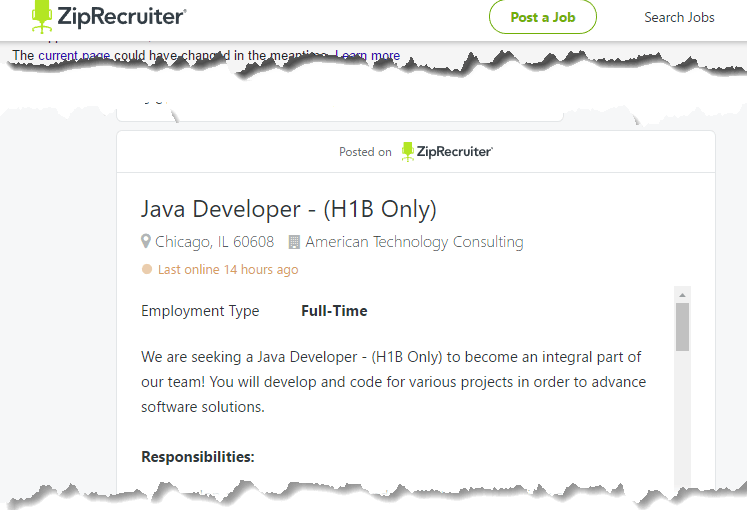
Jose told Lucas that her firm “did not write, condone, or authorize this language in the ad.”
So who wrote and authorized it? (An e-mail to Jose well before press time yielded no response.) More important, this ad is on ZipRecruiter. And as Lucas points out, it’s illegal. Possibly twice.
Was this an accident?
Is this accidentally at arm’s-length illegal?
When we were kids we’d walk up to a buddy, smack him, and chortle, “Sorry! I did it accidentally on purpose!” After we got smacked back a few times, we learned you can’t do that and get away with it. But in today’s employment industry, you can.
A company wants to hire Java developers on the cheap. As Lucas points out, it’s illegal to misuse the H1-B visa program to hire foreign labor cheaper than American labor.
But, can you “hire” a consultant from a “consulting” firm that in turn uses “a third-party vendor” that finds the Java developer by posting an illegal “H1-B Only” ad on ZipRecruiter — an ad that’s not written, condoned or authorized by the consulting firm? And besides, ZipRecruiter’s written policy says all ads must follow the law.
How many arm’s lengths from the l-o-n-g arm of the law are we now? Was that ad an accident? A one-off mistake?
Chatting with ZipRecruiter
I opened a chat with ZipRecruiter. Here’s what they told me.
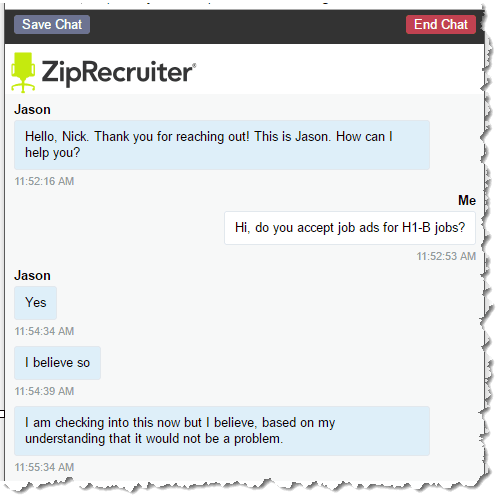
The chat with Jason timed out. So I asked Taylor.
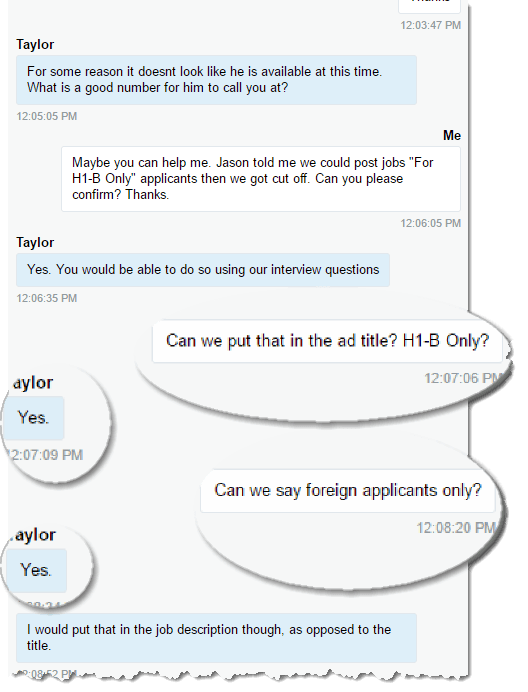
Is this accidentally on purpose?
I could have ended the chat there and we could have had an ad just like ATC had. But I kept asking the question in different ways. Finally, I was told it was up to me to make sure my job posting complied with “OFCCP and EEOC regulations.”
But here it was, three days after the Inc. article appeared, and on one screen I was chatting with ZipRecruiter and on another I was looking at that “H1-B Only” job posting — it was still there. The fastest way to hire H1-B Java Developers.
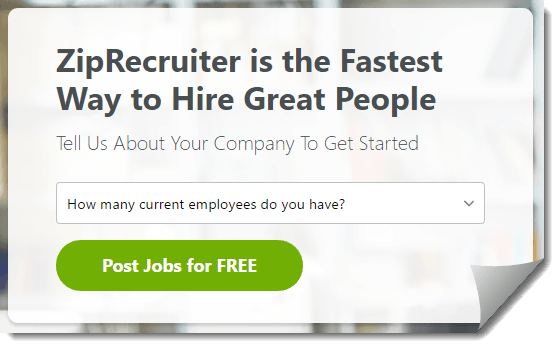
Sometimes Zip can also be the fastest way to scam people: Job seekers on ZipRecruiter being targeted by scams via email and text. Zip’s representatives blame it on “the front-end” and “the back-end.” But that’s just how the employment industry works — nobody’s fault. It’s all accidental: “No system is perfect, no matter how sophisticated or well intentioned,” says Zip.
Is this accidentally on purpose?
Are American employers using services that are largely unregulated to manipulate the job market? I don’t think there’s any doubt.
While state and federal legislatures feign interest in equal pay and equal opportunity, they condone a seemingly l-o-n-g arm’s-length chain of “contracting” relationships that seem to add no value to America’s employment system. How many middlemen can collect a fee to put you in a job working for someone other than who signs your paycheck?
This tawdry chain of consulting pimps seem to be sucking value out of the employment system and the economy — while government looks the other way. (See Consulting: Welcome to the cluster-f*ck economy.)
Notable companies that trade in profitable key words, profiles, resumes, and job postings are the front-facing businesses that are highly admired by a stock market that doesn’t give a rat’s ass about who’s getting a job, who they actually “work” for, where they came from, and who’s getting screwed by salaries that are manipulated in an international game of “How low can you go?”
“All Candidates In One Place”
Joshua Brustein, writing for Bloomberg, exposes the state-of-the-art in the nebulous jobs cloud: The Secret Way Silicon Valley Uses the H-1B Program.
Far from some of the transparently political H1-B conspiracy mongering that’s become the click-bait of the blog world, Brustein takes us on a wild tour that exposes the systematic manipulation of the job market being practiced and vaunted as a laudable “industry.” These are the consulting and contacting companies, and the slimy job boards, that big tech firms hide behind.
“Contractors are also submitting many applications for foreign visas for work at other large American technology companies, according to a recent analysis of Department of Labor records covering eight major tech businesses between October 2015 and October 2016. Applications submitted by contractors accounted for half of the H-1B visa applications for jobs at PayPal Holdings Inc.’s headquarters, 43 percent of those on Microsoft Corp.’s campus, 29 percent at EBay Inc.’s headquarters, and about a quarter of those at the Googleplex.”
Brustein outlines the work of one researcher who “found that American tech companies are also utilizing large numbers of H-1B workers that are not highly skilled — they are just doing it through intermediaries.”
Do you need a pedestrian Java programmer — but prefer a lower-cost “H1-B Only” variety? Someone’s willing to write an “unauthorized” and illegal job ad for you under yet someone else’s name — but nobody knows who exactly we’re talking about. But we know where to find that ad — it’s posted on an intermediary. Or, as ZipRecruiter’s crack marketing team likes to say: “All candidates in one place.”
LinkedIn? Indeed? ZipRecruiter? The applicants just roll into your dashboard, and they answer your secret questions before you have to interview them. How’s that for arm’s-length?
No “docs” — no resumes, no application forms. No communications with applicants — “no e-mails, attachments… phone calls…” Nada. 100% keywords, no humans need apply. No need for HR.
And the candidates? Scrub ’em up and get ’em ready.
Nobody knows
ZipRecruiter says job postings must follow the law. ZipRecruiter says you can post jobs for foreign applicants only. An “H1-B Only” ad appeared for a reason — somebody approved it. Who? Nobody knows.
The impact on pay is dramatic. Bloomberg’s Brustein makes it clear. Businesses use H1-B to save money. Imagine you could tell your board of directors you’ve cut your costs by a third. Well, now you can.
“They paid an average of $88,500, which is about two-thirds the average salary for visa applications for jobs the companies submitted directly.”
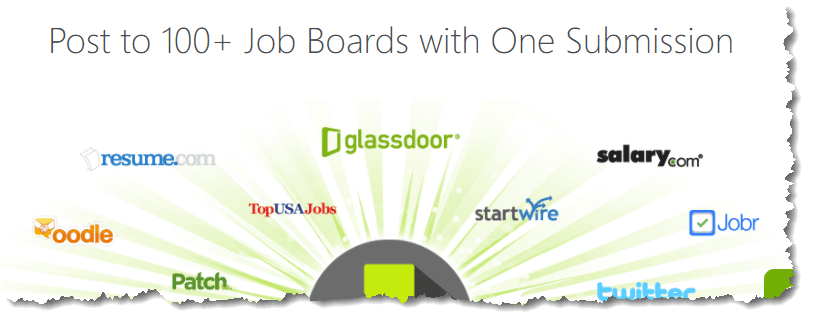
“Hiring people is probably the worst part of my job. It’s such a hassle — the searching. The sorting through resumes. We started using ZipRecruiter about 3 months ago. Right from the start you could tell it was going to make hiring a lot easier. One click and my job was posted to 100+ job boards — all the top sites.”
Who needs more regulating?
When a privately held company like ZipRecruiter can knock the HR profession entirely out of the recruiting and hiring process, and HR both swallows the insult and relinquishes its job entirely, it’s game over for job seekers, employees, and managers who actually produce value to create profit. (Should HR get out of the hiring business?)
When HR funds the radio ads that reduce the profession’s most important functions to “a hassle,” and ZipRecruiter’s representatives tell you in a chat that you can post jobs for “foreign applicants only” and for “H1-B Only,” none of this is an accident.
What needs more regulating? Employers and HR execs who let an industry of digital job-board pimps sell out American job hunters? Or vendors that insult and abuse them all the way to the bank? How many arm’s lengths away from federal employment-law violations can employers get?
Are we all nuts, or what? There’s an emperor running around buck naked, and the hue and cry is that there’s a shortage of clothes. Or is that a talent shortage? One click, and it’s all going to be a lot easier. You’ll just roll right into the dashboard head-first, and it’ll be no accident. It’s one great big submission. What do you think? What do we need to do to fix this?
: :


 A manager’s short course on how to hire
A manager’s short course on how to hire First, a little background.
First, a little background. When they’re job hunting, people rationalize. They’re afraid they won’t get picked, so they tolerate all kinds of niggling abuse. Making someone jump through hoops — online forms, silly rules about when references are due, eating dust when HR serves it — is not right, smart, or good business. But job seekers will probably jump through hoops because they want a shot at a job. Or that’s what they tell themselves. It’s for a shot at the job. So they tolerate demeaning and meaningless demands.
When they’re job hunting, people rationalize. They’re afraid they won’t get picked, so they tolerate all kinds of niggling abuse. Making someone jump through hoops — online forms, silly rules about when references are due, eating dust when HR serves it — is not right, smart, or good business. But job seekers will probably jump through hoops because they want a shot at a job. Or that’s what they tell themselves. It’s for a shot at the job. So they tolerate demeaning and meaningless demands. Today I received an e-mail from the Screening Company, asking for W-2s from the employer I worked for between 2005-2011. I happen to know that companies verify prior employment electronically, so I asked the Consulting Firm why they needed W-2’s. He said the Screening Company couldn’t confirm my employment. This made no sense to me. I said I would call the Screening Company to work this out, since there was a number on the e-mail for customer service. The recruiter at the Consulting Firm said not to do that, and that I should download the W-2s from the IRS.
Today I received an e-mail from the Screening Company, asking for W-2s from the employer I worked for between 2005-2011. I happen to know that companies verify prior employment electronically, so I asked the Consulting Firm why they needed W-2’s. He said the Screening Company couldn’t confirm my employment. This made no sense to me. I said I would call the Screening Company to work this out, since there was a number on the e-mail for customer service. The recruiter at the Consulting Firm said not to do that, and that I should download the W-2s from the IRS. I don’t see how your prior W-2 (salary) information is anyone’s business. If the Consulting Firm does its job right, it knows you’re qualified to do the job its client needs you to do. Otherwise, what’s it charging its clients for? What does it matter where you worked in 2011 or what you were paid? Just sayin’.
I don’t see how your prior W-2 (salary) information is anyone’s business. If the Consulting Firm does its job right, it knows you’re qualified to do the job its client needs you to do. Otherwise, what’s it charging its clients for? What does it matter where you worked in 2011 or what you were paid? Just sayin’. I have no idea how any of these entities can even stay in business with so many hands in the till. You’re not hired to work; you’re rented out to do work. The price being charged for your work far exceeds what you’ll see in your paycheck. Everyone’s getting paid for your work; everyone’s getting a taste of your pay. Good luck figuring it out, because I wouldn’t even start trying to. All I see is a hole in the economy, where money goes without the creation of any value. (See
I have no idea how any of these entities can even stay in business with so many hands in the till. You’re not hired to work; you’re rented out to do work. The price being charged for your work far exceeds what you’ll see in your paycheck. Everyone’s getting paid for your work; everyone’s getting a taste of your pay. Good luck figuring it out, because I wouldn’t even start trying to. All I see is a hole in the economy, where money goes without the creation of any value. (See  My advice is, work for your employer. Avoid any drain of economic value from your work. Don’t let middle-men interfere with the employer-employee relationship. The risk you take when you participate in this kind of cluster-f*ck economy is that you are not the worker. You are the product. You become an interchangeable part. Worse, you become a returnable interchangeable part.
My advice is, work for your employer. Avoid any drain of economic value from your work. Don’t let middle-men interfere with the employer-employee relationship. The risk you take when you participate in this kind of cluster-f*ck economy is that you are not the worker. You are the product. You become an interchangeable part. Worse, you become a returnable interchangeable part. What do you think of recruiters demanding the identity of my references — and demanding to check them — often before there’s even any expression of interest from the hiring manager? Some recruiters get seriously butt-hurt when I won’t instantly hand over references, and claim they won’t submit me otherwise.
What do you think of recruiters demanding the identity of my references — and demanding to check them — often before there’s even any expression of interest from the hiring manager? Some recruiters get seriously butt-hurt when I won’t instantly hand over references, and claim they won’t submit me otherwise. Recent reports from the Federal Reserve suggest that switching jobs — and probably employers — is the best way to boost your salary and your career.
Recent reports from the Federal Reserve suggest that switching jobs — and probably employers — is the best way to boost your salary and your career. I have your book,
I have your book,  Here are my two rules about salary disclosure:
Here are my two rules about salary disclosure: He was hoping to get a 10% salary bump. After a lot of assessment including talking with his references and having him talk with an industry expert whose opinion I respected, I knew he’d be great for a very different kind of job with my client.
He was hoping to get a 10% salary bump. After a lot of assessment including talking with his references and having him talk with an industry expert whose opinion I respected, I knew he’d be great for a very different kind of job with my client. Question
Question “Hospitals, nursing homes, home care agencies and doctor’s offices, like a lot of employers across the country, have a specific resume in mind. Employers often want new hires to have experience in a specialty such as operating room nursing.”
“Hospitals, nursing homes, home care agencies and doctor’s offices, like a lot of employers across the country, have a specific resume in mind. Employers often want new hires to have experience in a specialty such as operating room nursing.” WANTED: Top Talent Cheap!
WANTED: Top Talent Cheap! To Employers:
To Employers: Nick’s Quick Advice
Nick’s Quick Advice